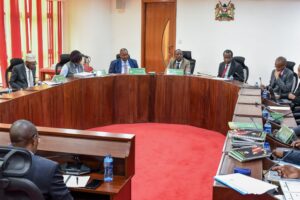Why 6000 Primary & Secondary Schools Will Not Receive Govt Funds
Share
The Ministry of Education has indicated that more than 6,000 primary and secondary schools across the country will not receive government capitation funds for failing to meet the registration and operational standards.
Appearing before the National Assembly Education Committee, Education Cabinet Secretary (CS) Julius Migos Ogamba stated that the government has only issued capitation to schools that are properly registered and compliant with the ministry requirements.
“We only issue capitation to schools that are registered and meet the necessary criteria,” CS Ogamba told the Committee.
He clarified that those schools with a low number of students , schools that had lower than 50 learners, schools with inconsistent registration or incomplete verification records were deemed non-compliant.
Besides the 6,000 schools, the Ministry also flagged 29 institutions whose capitation has been withheld because of registration issues and suspected ghost learners or ghost schools.
Also Read: Exam Candidate Killed on Her Way to School
Julius Melly the committee chair, expressed concern over how the affected schools were allowed to register students for national examinations while still being ineligible for funding.
“Why did you allow the 29 schools to register for exams yet you know they are not beneficiaries for capitation? Melly questioned.
CS Ogamba responded that the ministry cannot release funds to schools that have not been verified and noted that it remains unclear whether the schools even had registered candidates.
He emphasized that,”verification of registration and learner numbers is mandatory before capitation funds are disbursed.”
Also Read:CS Ogamba Speaks Out Amid Nationwide Lecturers’ Strike
The development comes amid a larger capitation crisis with public schools reportedly struggling to operate because of the funding insufficiency.
Impacts on Schools and Learners.
Those schools that are not registered with the minimum required number of learners will not get government funds until the deficiencies are corrected.
Students in such organizations are exposed to inconveniences, since capitation funds play the most important role in running the day-to-day activities of the institutions, including acquisition of learning resources and support personnel.
Without the capitation, the parents and local communities might be compelled to incur extra expenses.
According to the Ministry, the continuous verification process is an extension of an extensive accountability initiative to wipe the system of ghost schools and ghost learners.
Direction and Next Steps of Ministry.
The Ministry has instructed that in the future only registered schools which have verified data of learners will enjoy capitation.
It has been encouraged that school heads should provide correct enrolment records and fulfill their requirements to be eligible.
In the meantime, the Education Committee has insisted on a comprehensive report of the institutions affected and the possibilities of the time-scale within which they will be placed under proper management.
Follow our WhatsApp Channel and WhatsApp Community for instant news updates

National Assembly Education Committee meeting with Cs of Education Julius Ogamba
Image/NA/X


